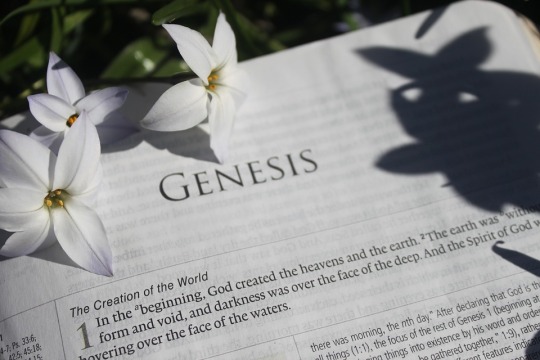#biblical illiteracy
Text

Is polyamory the future?
He seems scared <checks notes>:

I guess dominionists figure they've trounced the LGBTQIA crowd, and now they're gunning for . . . the "not terribly popular" practice of . . . polyamory?
What ever happened to feeding the poor and healing the sick?
#shadi hamid#fuller theological seminary#dominionism#trumpistan#theocracy#culture war#biblical illiteracy
2 notes
·
View notes
Photo

"Biblical illiteracy will make you fail in your faith. Read your Bible."
- Samuel Sey
7 notes
·
View notes
Text
Just wanna say something: It is a sin and a shame for an investment banker to call himself "an old-time Christian", and arrange for his client's CEO to make 350 times what the company's employees make.
1 note
·
View note
Text
Biblical Illiteracy is a Deepening Problem

View On WordPress
0 notes
Text
Genesis 1-11: The Existence and Presence of Almighty God, Part 1
How can we, in our finite minds conceive the foolish idea that nothing put something into existence?
By Donald Whitchard
Genesis 1:1,Colossians 1:16-18,John 1:1-4,Isaiah 40:28,Acts 17:24,Hebrews 1:10,Hebrews 11:3
Summary: The presence and personal interest of God in the affairs of His creation is evident to those who have eyes to see (Romans 1:18-22). He gives us proof of His existence,…

View On WordPress
#biblical illiteracy#Creation#Creator#END TIMES#Genesis#hatred towards God#lack of knowledge#sharing the gospel
1 note
·
View note
Text
The Scandal of Biblical Illiteracy
Claude MariottiniEmeritus Professorof Old TestamentNorthern Baptist Seminary
One of the greatest books of the Old Testament is the book of “Palms.” The book of “Palms” is that Old Testament book that “recorded how ancient Israelite prophets would sit under one of those trees until a coconut fell on their heads, cracking open and pouring out the milk of human kindness along with the wisdom of…

View On WordPress
1 note
·
View note
Text
St. Jerome, the model interpreter of Scripture
From Scripturae Sacrae Affectus,Pope Francis' Apostolic Letter on St. Jerome:
‘Biblical passages are not always immediately accessible. As Isaiah said (29:11), even for those who know how to “read” – that is, those who have had a sufficient intellectual training – the sacred book appears “sealed”, hermetically closed to interpretation. A witness is needed to intervene and provide the key to its liberating message, which is Christ the Lord. He alone is able to break the seal and open the book (cf. Rev 5:1-10) and in this way unveil its wondrous outpouring of grace (Lk 4:17-21). Many, even among practising Christians, say openly that they are not able to read it (cf. Is 29:12), not because of illiteracy, but because they are unprepared for the biblical language, its modes of expression and its ancient cultural traditions. As a result the biblical text becomes indecipherable, as if it were written in an unknown alphabet and an esoteric tongue.
‘This shows the need for the mediation of an interpreter, who can exercise a “diaconal” function on behalf of the person who cannot understand the meaning of the prophetic message. Here we think of the deacon Philip, sent by the Lord to approach the chariot of the eunuch who was reading a passage from Isaiah (53:7-8), without being able to unlock its meaning. “Do you understand what you are reading?” asked Philip, and the eunuch replied: “How can I, unless someone guides me?” (Acts 8:30-31).[32]
‘Jerome can serve as our guide because, like Philip (cf. Acts 8:35), he leads every reader to the mystery of Jesus, while responsibly and systematically providing the exegetical and cultural information needed for a correct and fruitful reading of the Scriptures.[33] In an integrated and skilful way he employed all the methodological resources available in his day – competence in the languages in which the word of God was handed down, careful analysis and examination of manuscripts, detailed archeological research, as well as knowledge of the history of interpretation – in order to point to a correct understanding of the inspired Scriptures.
‘This outstanding aspect of the activity of Saint Jerome is also of great importance for the Church in our own time. If, as Dei Verbum teaches, the Bible constitutes as it were “the soul of sacred theology”[34] and the spiritual support of the Christian life,[35] the interpretation of the Bible must necessarily be accompanied by specific skills."
6 notes
·
View notes
Text
Out of all this exuberant illiteracy there arose a problem, however. While storming the gates of heaven might be achieved with no education at all, storming the gates of the elite villas of Rome required a little more sophistication. Educated Romans and Greeks such as Celsus and Porphyry had long looked at the literature of Christianity with the utmost disdain – and writers such as Augustine and Jerome knew it. Part of the problem was the Bible: not only what it said but the way in which it said it. Today, robed in the glowing English of the King James Version, it is hard to imagine the language of the Bible ever causing problems. In the fourth century it had no such antique grandeur. The gospels of the old Latin Bible were written in a distinctly demotic style, rich in grammatical solecisms and the sort of words that grated on educated ears. The loss of meaning was negligible – the ancient equivalent of saying ‘serviette’ rather than ‘napkin’. The loss of status was intolerable. If this was the word of God, then God seemed to speak with a distinctly common accent.
And this society had an acute ear for accents. Augustine grew up knowing that grammatical error was more frowned on than moral error and that one might be more despised for saying ‘’uman being’ than one would for being the sort of human being who judged another on his accent. Aitches in Latin, as in Victorian England (and indeed modern Britain), were often a giveaway of class, and the ability to know where to put them was the mark of a gentleman. The upper-class Catullus had sneered mercilessly at a man who, anxious to sound more aristocratic than he was, managed to misplace his. In this aspirational world the language of the Bible was deeply embarrassing.
Augustine, well aware of this, launched into a defence of the Bible’s register: what did it matter, he asked hotly, if one used the wrong word or the incorrect grammatical case? Everyone understood what was being said anyway, whatever words or cases it was said with. What did it matter, when you were beseeching God to pardon your sins ‘whether the word ignoscere (to pardon) should be pronounced with the third syllable long or short’? God might pardon such grammatical sins: Roman aristocrats would not. The simplicity of Christian texts repelled many who might otherwise have considered converting, and shamed many who already had. To convert was, in the words of that telling Augustine phrase, to enter the intellectual world less of a Plato or a Pythagoras than of your concierge. The upper classes simply weren’t going to countenance that; and as long as they stood firm against Christianity then many below them would too. This disdainful elite was, Augustine said, the ‘ramparts of a city that does not believe, a city of denial’.
[...]
Everywhere, Christian intellectuals struggled to fuse together the classical and the Christian. Bishop Ambrose dressed Cicero’s Stoic principles in Christian clothes; while Augustine adapted Roman oratory for Christian ends. The philosophical terms of the Greeks – the ‘logos’ of the Stoics – started to make their way into Christian philosophy.
Not all attempts at assimilation were so successful. One poet rewrote the Gospel of John in the style of a Homeric epic. Another scholar, during the reign of Julian the Apostate – who forbade anyone who didn’t believe in the old gods to teach works such as Homer that contained them – redrafted the entirety of biblical history in twenty-four books of Homeric hexameter and recast the Epistles and the Gospels into the form of Socratic dialogues. Fanciful intellectual genealogies were invented to defend Christianity’s favourite philosophers. Long-dead thinkers who happened to have any resemblances to Christianity in their writings found themselves adopted as unwitting ancestors in the tradition. The whiff of Christianity hung around Plato? Ah, that was because he had visited Egypt and, while there, he had perhaps read a copy of the first five books of the Bible that Moses had, conveniently, left behind. He was, really, one of us. Socrates was a Christian before Christ.
-- Catherine Nixey, The Darkening Age: The Christian Destruction of the Classical World
18 notes
·
View notes
Text
Christ alive the more i interact w actual fandom the more i know why i came to hate it so much lol. It's not even that theyre annoying it's moreso the pervading media illiteracy and anti-intellectualism of it all. Usually i just reblog art and leave some compliments on the posts that end up on here in case the artist sees them but you know outside of that it really is just me and my close circle. No good fandom, only good friends and all. Anyway if i see one more person slap the label "biblically accurate" onto an angelic or angel-coded character im going to secrete toxic chemicals that scientists wouldnt even dream was in the elephant's foot. Pretty certain that it has antisemitic undertones
4 notes
·
View notes
Text
I've seen people cry and have breakdowns over thinking that music will open you to a demonic hold on you and a grown woman cry because her ADULT daughter was watching the new Wendell and Wild animation because they kept saying demons. Funny how I've been accused of being sensitive when actual violence was happening in front of me, but ohhhh nooo music and movie BAD. This concept of fragility to music and content is not addressed biblically, at least our modern conception of content. We have to remember the history of the church and its use of illiteracy in order to keep a 'peaceful flock' of followers. These concepts come from modern pastors and fear of keeping followers under THEIR guidance. Fear is a strong emotion, be mindful when people are trying to make you afraid and why they might be doing so. I don't think withholding yourself from media makes you more pious, I think that it's good to be mindful about what content we put in front of ourselves and children, but there is a fineline between a cultured diet of media and propaganda level censorship. If that's not enough to sway you, eve already ate the fruit of knowledge and ignorance won't save you in the end :P
3 notes
·
View notes
Link
We discuss reviews on the Jesus Revolution movie, some American church history, the Asbury KY revival, spiritual fruit, worship music movement, declining biblical worldview in the church, transgender issues in education and culture, and increasing evil (Isaiah 5:20) allowed in government-run education system.
#Stand Up For The Truth#Pastor Randy White#revival#revolution#Biblical illiteracy#Stand Up For The Truth Podcast#standupforthetruth.com
5 notes
·
View notes
Note
It's so heartbreaking to see how even all the famous so called christians fight for the right to kill babies. I can't explain how it's possible to misinterpret God's word in a way that killing another human being is someone's right.
I would say there are two major parts to this with the professing christian (maybe everyone?): biblical illiteracy & seeing a lot of women in a lot of pain
9 notes
·
View notes
Text

Africa's Catholics seem to think they can use their clout as some kind of leverage against the Bible.
No.
Read the entire Bible, Africa. Then, read it again. It's a book; not a verse, and there's plenty in it to support Francis' decision to bless same-sex unions.
0 notes
Text

Daily Devotionals for December 3, 2022
Proverbs: God's Wisdom for Daily Living
Devotional Scripture:
Proverbs 29:18 (KJV):
18 Where there is no vision, the people perish: but he that keepeth the law, happy is he.
Proverbs 29:18 (AMP):
18 Where there is no vision (no redemptive revelation of God), the people perish; but he who keeps the law (of God, which includes that of man) --blessed (happy, fortunate, and enviable) is he.
Thought for the Day
The history of those nations that have had God's light demonstrates the truths of today's proverb. Whenever Israel turned away from God, such as during Samuel's early life, the nation suffered. "…And the word of the LORD was precious in those days; there was no open vision" (1 Samuel 3:1). Judges 21:25 reveals the terrible state of lawlessness and violence into which Israel had fallen when Samuel was a child, for "every man did what was right in his own eyes."
History illustrates that times become very dark when a vision of God's revelation departs. The fall of the Roman Empire in 476 A.D. is generally regarded as the ending of ancient history and commencing of Europe's Dark Ages. The Roman Empire brought peace, prosperity, culture, and learning to Europe. When it fell, the Romans were followed by illiterate barbarians. Western Europe plunged into political chaos and social disorder. Civilization almost completely disappeared. Illiteracy and ignorance of God's ways governed nobles and peasants alike. Education and literacy were relegated to monasteries. Churchmen preserved the Bible and other books that had been written in Latin before Rome's fall, but records from this period of the "Dark Ages" bear little clarity. The works of the many clerics of this time are inconsistent and show great ignorance because they accept fanciful stories as truth.
Satan strives to keep people in ignorance, and "in the dark." He has tried many times to destroy Scripture, prohibit the preaching of the Gospel, and persecute God's people. When a society turns its back on God and restricts the Gospel, as many nations have done, that nation regresses into violence and immorality. Those opposing the Bible do not realize that they are opposing the very influences that make life pleasant, for God is light and His light brings revelation, which liberates people. The revelation of Biblical truths and their practice of them always produces an orderly and civilized society and affects all aspects of its culture positively.
True Christians strive to obey God's commandments, not as a means of getting to heaven, but because they desire to honor and please God. Heavenly vision and revelation come to those who know Christ. Without this vision, people perish. "Behold, the days come, saith the LORD GOD, that I will send a famine in the land, not a famine of bread, nor a thirst for water, but of hearing the words of the LORD: And they shall wander from sea to sea, and from the north even to the east, they shall run to and fro to seek the word of the LORD, and shall not find it" (Amos 8:11-12).
Prayer Devotional for the Day
Dear heavenly Father, thank you for giving us Your revelation and vision. I do appreciate the light You give me as I am walking in a dark and fallen world. Lord, fill me with the Holy Spirit so that I will always be filled with Your light and love. Draw those who do not know You, unto that light. Fill my mouth with the right words so that those who do not know You can hear the gospel and come into the knowledge of Your dear Son, Jesus. May I practice good deeds in this life, so that others may see them and thereby bring glory unto You? I ask this in the name of Jesus. Amen.
From: Steven P. Miller
CEO/ Founder of Gatekeeper-Watchman International Groups
Jacksonville, Florida., Duval County, USA.
@ParkermillerQ, @GatekeeperWatchman1,
GWIG, #GWIN, #GWINGO, #Ephraim1, #IAM, #Sparkermiller
2 notes
·
View notes
Text
The climate change religionists who control the California government have voted to ban the sale of gas cars soon, with the hopes of forcing everyone into more environmentally conscious electric cars. But that same California government is warning its citizens that they don't have enough electricity for them to charge their electric cars or run their refrigerator.
Keep in mind, California has the world's 5th largest economy with a gross state product of $3.4 trillion. Imagine what these kinds of policies do to areas of the world that are not nearly so rich. It defies common sense to believe that Christians are offering "hospitality" or "loving their third world neighbors" by advocating global policy that will prevent industrialization and lock the world's poor in abject destitution.
If the NAE or any other pseudo-Christian organization wants to try to convince me to join their favored political crusade, I'm all ears. But when you're advocating the global implementation of a regressive burden that harms the poor by disproportionately limiting their resources and mobility, it would be best to leave the Bible out of it.
#THANK YOU#this article so neatly communicates my thought on this subject#performative Christianity is always destructive in one way or another#christianity#christian living#Christian environmentalism#we are called to be good stewards but nothing in the green agenda is good stewardship
2 notes
·
View notes
Text
Christians and the Old Testament
Christians and the Old Testament
Claude MariottiniEmeritus Professorof Old TestamentNorthern Baptist Seminary
In his article, “The Changing Face of Old Testament Studies,” (Christian Century 109 [October 21, 1992, pp. 932-35]), Christopher Seitz spoke of the problem professors face when teaching the Old Testament to new students in seminaries, divinity schools, and universities. The problem, according to Seitz, is that “students…

View On WordPress
1 note
·
View note